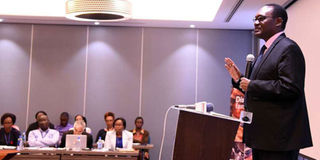Breaking News: At least 10 feared to have drowned in Makueni river
Mining firms sue Kenya over permits

Trade Principal Secretary Chris Kiptoo addresses the National Agoa Strategy Validation Workshop at Radisson Blu Hotel, Nairobi, on January 18, 2018. The government must move forcefully to protect investors from extortionists and elites. PHOTO | DIANA NGILA | NATION MEDIA GROUP
What you need to know:
- The government said Cortec’s 21-year licence was unprocedurally issued and was against regulations.
- Dr Kiptoo said the cancellations were inspired by the need to safeguard the environment.
Global mining firms are demanding Sh334 billion from the government as compensation for cancelling their licences.
About 10 different cases have been brought to the attention of the International Centre for Settlement of Investments Disputes (ICSID) based in Dubai regarding the revocation of their exploration permits.
Trade Principal Secretary Chris Kiptoo said Kenya is actively involved in the cases and that all agreements with global firms are under review.
“There are ongoing cases at ICSID with claims amounting to Sh334bn. We have seen how vague language in investment treaties can result in massive payouts.
"Kenya has developed a model investment treaty and an investment agreements policy with clear rules and responsibilities,” he said at the 11th Annual Forum of Developing Country Investment Negotiators in Nairobi.
INVEST
One of the disputes involves a Sh200 billion claim by Cortec Kenya and a Sh61.8 billion claim by WalAm Energy Inc.
The others have not been posted on the ICSID’s website.
However, other firms that have lost their licences include Sirmonet Mineral Kenya, Yongtai Mining Company, Balham Trading Company, Ololunga Mining and Industrials as well as AQ Kenya Gold Ltd.
Cortec’s prospecting licence for Niobium and rare earth at Mrima Hills in Kwale was revoked months after it obtained a National Environmental Management Authority permit and announced a Sh44 billion investment in the venture.
CONTRACT BREACH
The government said Cortec’s 21-year licence was unprocedurally issued and was against regulations banning the exploration of minerals in a gazetted forest.
WalAm’s 30-year licence to explore for geothermal suffered a similar fate in 2012 when the Government accused it of breaching contract terms with regard to the construction of geothermal plants.
Dr Kiptoo sought to justify the licence cancellations, saying they were inspired by the need to safeguard the environment, public health, avert taxation disputes and appease communities identified for eviction to pave the way for the mining projects.





